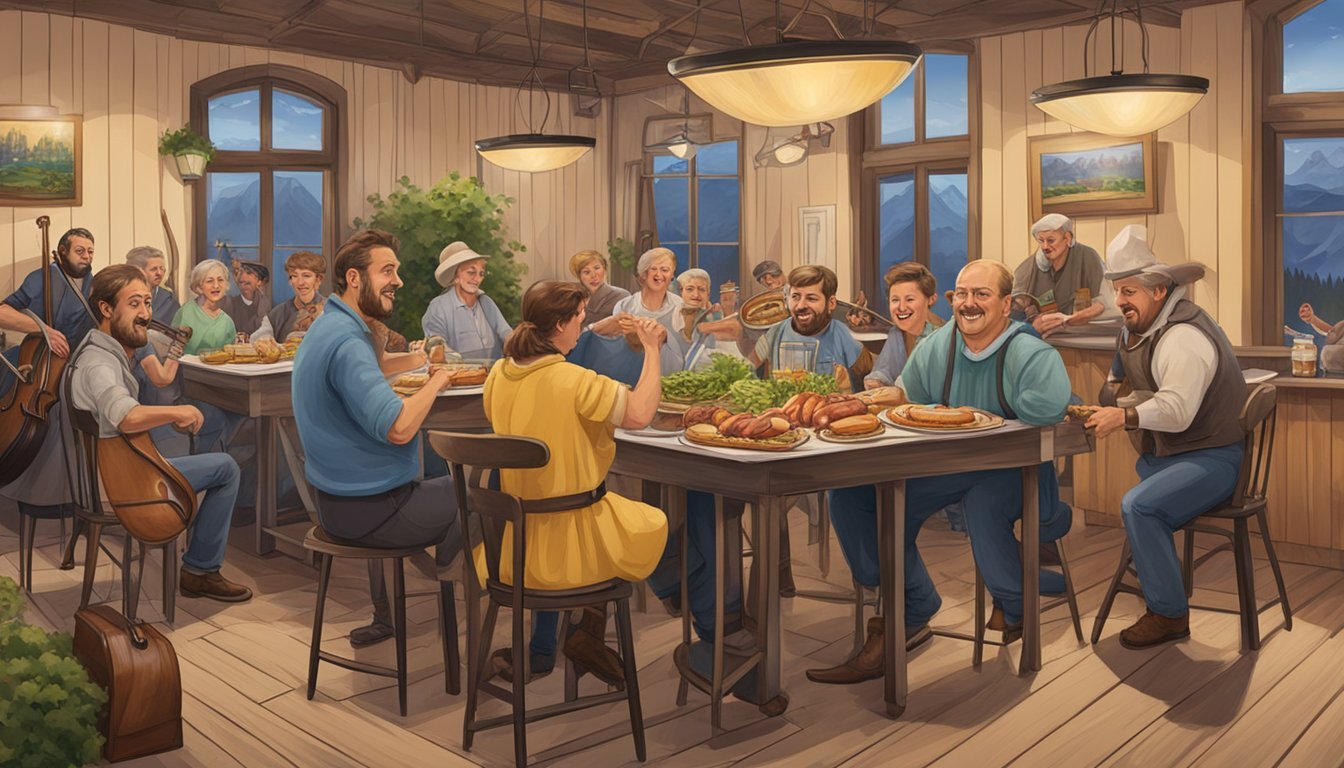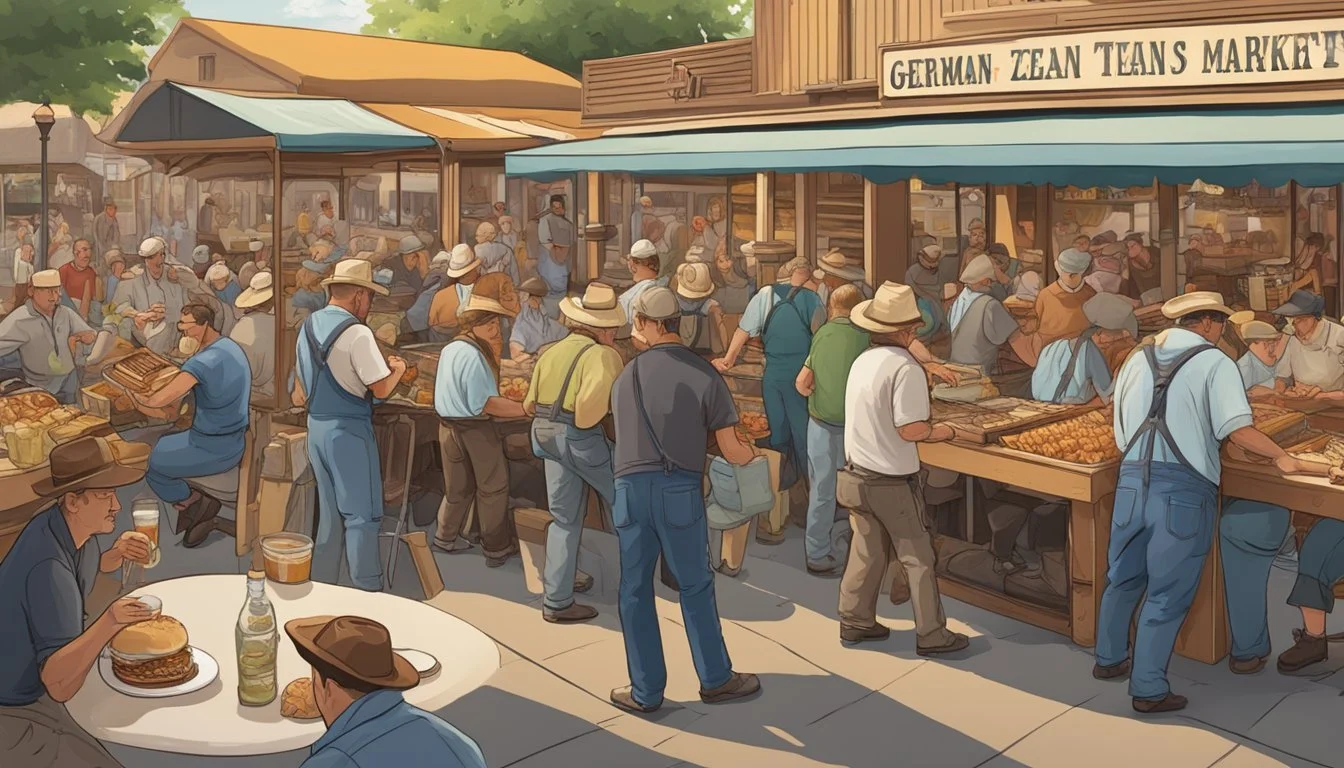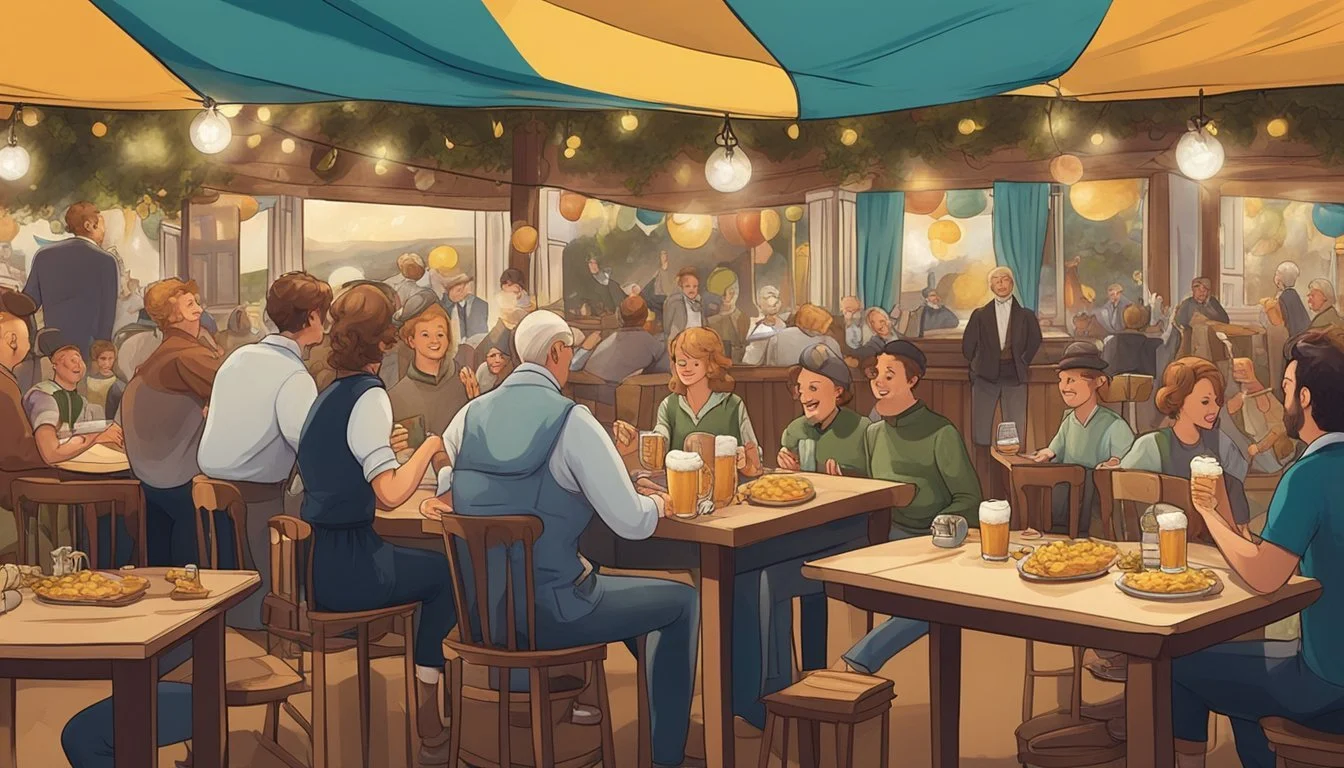German Texan Food and Music Pairings
A Guide to Cultural Fusion Cuisine
The union of German heritage with Texan gusto has given rise to a unique cultural tapestry, especially in the domain of gastronomy and entertainment. In Texas, where cultural roots run deep, German Texans have long been sharing their traditional foods and melodies. These cultural celebrations are often most vibrant during events such as Oktoberfest, held in several Texas cities, where music and food are the heart of festivities. German Texan festivals, much like the historic ones in Galveston, offer more than just a nod to the past; they serve as bustling, contemporary stages for cultural exchange.
In these gatherings, one can experience the harmony between hearty German dishes and the accompanying folk tunes. Culinary delights such as soft pretzels, schnitzels, and sausages are enjoyed alongside a variety of German beers, with each pairing designed to complement the other's flavor profile. Such gastronomic pairings are not limited to festival settings. For example, throughout Texas, German-inspired eateries take pride in combining local ingredients with traditional recipes, offering a year-round tasting experience, accompanied often by live music that sustains the celebratory ambiance.
Moreover, German Texan food and music pairings reflect a broader story of cultural resilience and adaptation. Passed down through generations, these traditions have been respectfully preserved while also embracing the Lone Star State's spirit. This cultural synergy not only enriches the state's diverse cultural landscape but also stands as a bridge between the past and present, connecting communities through shared heritage and mutual appreciation for good food and music.
Historical Context
This section delves into the origins of German Texans, focusing on the early waves of German immigration and their profound cultural and societal influence on Texas.
German Immigration to Texas
In the mid-19th century, German immigrants began arriving in Texas, drawn by the promise of land grants and economic opportunity. The Adelsverein, also known as the German Emigration Company, played a pivotal role in this migration. It was established to protect and promote the interests of German immigrants in Texas. Prince Carl of Solms-Braunfels, representing the Adelsverein, orchestrated the settlement of New Braunfels, one of the first German enclaves, in 1845. Towns like Fredericksburg followed, further establishing a German settlement pattern in Central Texas.
Cultural and Societal Impact
The influence of German migrants on Texan culture is undeniable. They imported their traditions, language, and music, leaving an indelible mark that persists to this day. During World War I, anti-German sentiment pressured many to assimilate; however, the protection of German immigrants' heritage continued. In the realm of food and music, the fusion of German and Texan elements emerged, combining the robust flavors of German cuisine (What Wine Pairs Perfectly With German Cuisine) with Texan ingredients and the melodious sounds of German folk music with local flair. German influence in Texan culture is still celebrated today, particularly at events like Wurstfest in New Braunfels. Descendants of German immigrants often retain elements of the German language and heritage, from architecture to the annual festivities that honor their ancestors.
Culinary Delights
German-Texan cuisine harmoniously blends hearty German traditions with Texan flavors, creating an array of delectable dishes that cater to a variety of palates and preferences.
Iconic German-Texan Dishes
Integral to the German-Texan table are bratwursts and schnitzels, often accompanied by sides of sauerkraut and spaetzle. Meat, being a staple, ranges from pork to beef and chicken, each prepared with a distinct German twist. For instance, bratwursts—succulent pork sausages (What wine goes well with pork sausages?) —are typically served with German mustard and freshly baked bread, while schnitzels—thin, breaded, and fried cutlets (often veal or chicken)—are a must-try with a squeeze of lemon.
Bratwurst: Pork sausage, German mustard
Schnitzel: Veal or chicken, breaded and fried, lemon wedge
Sides: Sauerkraut, spaetzle, red cabbage, potato salad
The Evolution of German-Texan Cuisine
From the earliest German settlers to contemporary fusion trends, German-Texan cuisine has continued to evolve. New recipes infuse traditional elements like red cabbage and potato pancakes with Texan barbecue techniques, leading to inventive dishes like smoked brisket-filled dumplings. Restaurants in Austin, San Antonio, and Fredericksburg, such as Alpine Haus, Fabi + Rosi, and Der Lindenbaum, have been instrumental in this culinary renaissance, shaping a unique dining landscape.
Fusion Incorporations: Brisket, BBQ flavors, Texan spices
German-Texan Evolution: Smoked meats with traditional German spices
German-Texan Dining Experiences
Dining in German-Texan eateries promises more than just a meal; it's a full sensory immersion. Breakfast menus often feature baked goods like pastries, whereas lunch and dinner flaunt robust platters of meats and artisanal beer selections. Easy Tiger in Austin offers a casual café-style setting where diners can enjoy artisanal breads and pretzels, representative of the German influence on Texan baked goods.
Breakfast: Pastries, artisanal breads
Lunch/Dinner: Meat platters, sausages, beer pairings
Restaurants: Easy Tiger (Austin), Alpine Haus (New Braunfels), Der Lindenbaum (Fredericksburg)
Beverage Traditions
In Texas, the confluence of German heritage and local culture has brewed a unique beer tradition that emphasizes both the classical Bavarian styles and the entrepreneurial spirit of Texan breweries.
German Beers and Brewing
German settlers brought with them to Texas their rich brewing traditions, deeply embedded in Bavarian beer culture. These brewing techniques focus on purity and precision, often adhering to the "Reinheitsgebot," the German beer purity law. In Texas, this tradition is celebrated annually at events like Wurstfest in New Braunfels and Oktoberfest celebrations across the state, where the influence of Munich is strongly felt. Festbiers and Märzen are among the popular styles, with their malty flavor and higher alcohol content.
Local Texan Breweries with German Roots
Central Texas, and particularly cities like Austin, Boerne, New Braunfels, and Fredericksburg, are hubs for breweries that proudly reflect their German roots. The Texas Hill Country, due to its land and climate, has become fertile ground for brewing activity. These breweries often incorporate Texan flair into their creations while preserving German techniques. For example:
Austin: Known for its craft beer scene, many Austin breweries infuse local ingredients into classic German styles.
New Braunfels: Host to Wurstfest, it's a city where German beer traditions live on and evolve through local breweries.
Fredericksburg: This town maintains a strong connection to its German heritage with several breweries that showcase traditional German-style beers.
Traditional Beverages and Pairings
The marriage of German fare with suitable beverages is a testament to the state's culinary diversity. Classic pairings include:
Märzen/Oktoberfest beers: Paired with hearty sausages or Schweinshaxe, a Bavarian delicacy.
Dunkel: Best enjoyed with robust meats like beef.
Wheat beers: A match for dishes like Käsespätzle and potato dumplings, favored for their balance with the starchy and cheesy flavors.
These traditional pairings are not only a nod to Bavarian customs but have been wholeheartedly embraced and improvised upon by the Texan palate.
Musical Harmony
Exploring German-Texan culinary and musical pairings reveals a rich tapestry of cultural fusion. This section examines the interplay between traditional German music and Texan festivity, providing a backdrop for the culinary delights that have emerged from this synthesis.
German-Texan Musical Influence
German immigrants brought with them to Texas a vibrant musical heritage that resonates through the Texas Hill Country. Polka, a lively dance music genre, quickly became a staple at gatherings, blending seamlessly with Texan sounds. San Antonio, a hub of German Texan culture, showcases this fusion. Music venues and events often feature a mix of German and Texan styles, creating a unique auditory experience.
Instruments commonly heard:
Accordion (prominent in Polka)
Guitar (Texan influence)
Brass instruments like the tuba (German heritage)
Festivals and Live Music Events
Festivals and live music events are the heartbeats of German-Texan musical harmony. They serve as stages for perpetuating traditions and encouraging the intermingling of cultures through music and dance. Wurstfest in New Braunfels is an annual salute to sausages, beer, and German music where polka flourishes. Scholz Garten in Austin, the oldest live music venue in Texas, regularly hosts musical acts that pay homage to German roots, and Oktoberfest celebrations across Texas hill country highlight the love for live music, polka, and dance, essential aspects of both German and Texan festivities. Saengerfest, another German tradition still alive today, features choral singing and showcases the enduring influence of German culture on Texan music and community spirit.
Modern Legacy and Community
The German Texan community continues to thrive through vibrant festivities, educational endeavors, and significant economic contributions that respect and preserve their rich heritage.
Community and Festivities
Festivals like Wurstfest and Oktoberfest are cornerstones of the German Texan community, drawing thousands to towns like New Braunfels and Fredericksburg in the Texas Hill Country. These events celebrate German culture with traditional food, such as sausages and pretzels, paired with local Texas beers. The music ranges from polka to oompah, creating a lively atmosphere where descendants of German immigrants and Texans alike share in the cultural legacy.
Education and Preservation
Museums and historical societies play a critical role in honoring German Texan heritage. They serve not only as repositories of history but also as educational resources that offer insight into the traditions and contributions of German immigrants. Efforts in preservation include language courses and culinary classes that teach traditional German cooking techniques, ensuring that German culture remains an integral part of Texas's diverse identity.
Economic Contributions
The influence of German Texans extends into various industries, including agriculture and hospitality. Many local restaurants offer German-Texan cuisines, where dishes like schnitzels and kolaches are staples. The appeal of these foods helps support the economy of communities where they're prominent. German Texans have also made their mark in the beer industry, with several breweries in Texas drawing on German brewing methods and styles, further entwining German heritage with the economic fabric of the state.
Conclusion
German-Texan culture has woven a rich tapestry of flavors and sounds across the state of Texas. The unique blend of German food traditions with Texan ingredients has resulted in an innovative array of dishes that pay homage to both heritages. From the smoked sausages reminiscent of European practices to the fusion cuisine found in the Texan melting pot, these culinary delights reflect a shared history and a love for hearty, satisfying meals.
German Influence on Food: Incorporation of German cooking techniques, like smoking and curing meats, into Texan cuisine.
Cuisine Highlights: Celebrated dishes include smoked sausages, Texas hot gut, and German-inspired brisket preparations.
Music Pairings: Traditional German folk tunes blend with country-western melodies, providing a festive backdrop to the culinary experience.
Music plays an equally important role in this confluence of cultures. German folk tunes have evolved by intertwining with Texas's own country music, offering a lively accompaniment to any meal. Cultural events like Wurstfest in New Braunfels showcase this unique blend, inviting visitors to revel in the joyous melodies while savoring authentic German-Texan dishes.
In Texas, the legacy of German settlers continues to thrive, influencing modern culture, cuisine, and music. Through local festivals, restaurant menus, and community gatherings, Texas celebrates its German heritage, ensuring that these flavorful and melodic traditions remain an integral part of its identity.








